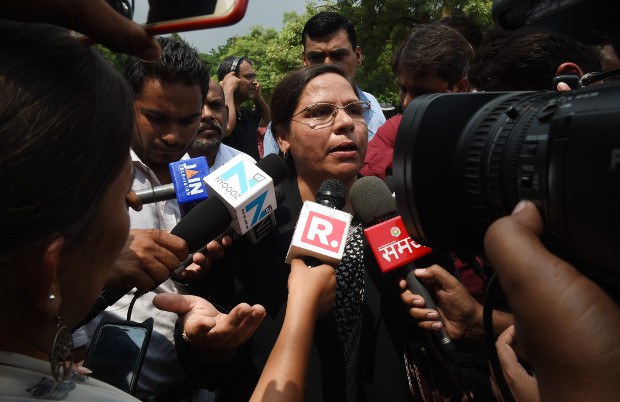India: Court Declares Muslim Divorce Practice Unconstitutional
2017.08.22
Mumbai, India
 Indian Supreme Court advocate Farha Faiz speaks to reporters outside the Supreme Court in New Delhi following the split ruling against the Muslim triple talaq divorce practice, Aug. 22, 2017.
Indian Supreme Court advocate Farha Faiz speaks to reporters outside the Supreme Court in New Delhi following the split ruling against the Muslim triple talaq divorce practice, Aug. 22, 2017.
The traditional Islamic practice of unilateral divorce that allows a man to part with his wife by uttering the word talaq (divorce) three times is unconstitutional, India’s top court ruled Tuesday.
The three-two split among the five-member Supreme Court bench came amid growing clamor over petitions filed by Muslim women who challenged the validity of the practice.
“In view of the differing opinions recorded by a majority … the practice of talaq-e-biddat (triple talaq) is set aside,” the court said in its judgment.
“It is clear that this form of talaq (divorce) is manifestly arbitrary in the sense that the marital tie can be broken capriciously and whimsically by a Muslim man without any attempt at reconciliation so as to save it. This form of talaq must, therefore, be held to be violative of the fundamental right contained under Article 14 of the Constitution of India.”
The practice of triple talaq has been facing growing criticism in India over the past few years on grounds of inequality.
Indian Prime Minister Narendra Modi responded to the ruling through a Twitter post, saying, “Judgment of the Hon’ble SC on Triple Talaq is historic. It grants equality to Muslim women and is a powerful measure for women empowerment.”
The chief of Modi’s Hindu nationalist ruling Bharatiya Janata Party (BJP), Amit Shah, also hailed the verdict.
“It is the beginning of a new era for Muslim women in India,” Shah said.
Muslim woman sought ban
The issue grabbed headlines in 2015 when Shayara Bano, a Muslim woman, filed a petition seeking a ban on the practice.
Bano’s husband annulled their 15-year marriage by sending a letter with the word talaq written three times.
Although the judgment was largely welcomed, many were guarded with their opinion.
“Today is it the Muslims, tomorrow it will be other minorities. The court should have taken a view keeping all women into consideration rather than just Muslim women,” senior lawyer Gulnaaz Sadar Amin told BenarNews.
Meanwhile, the All India Muslim Personal Law Board (AIMPLB) said it was not ready to respond to the ruling.
“We need time to study it. We have meeting scheduled next month. We will discuss it then and explain the meaning of the judgment to our Muslim brothers,” AIMPLB’s Kamal Faruqui told BenarNews.







